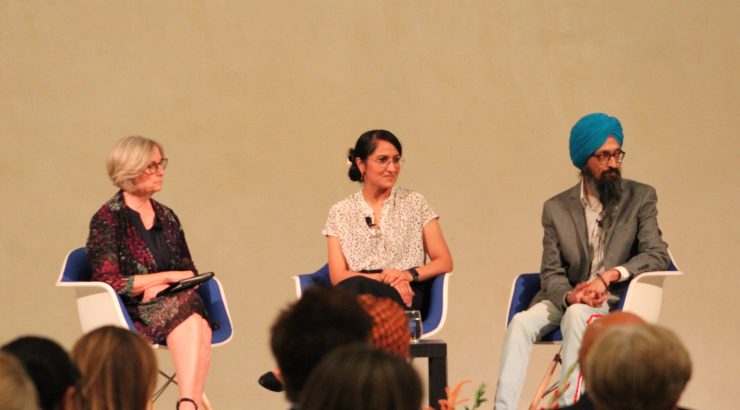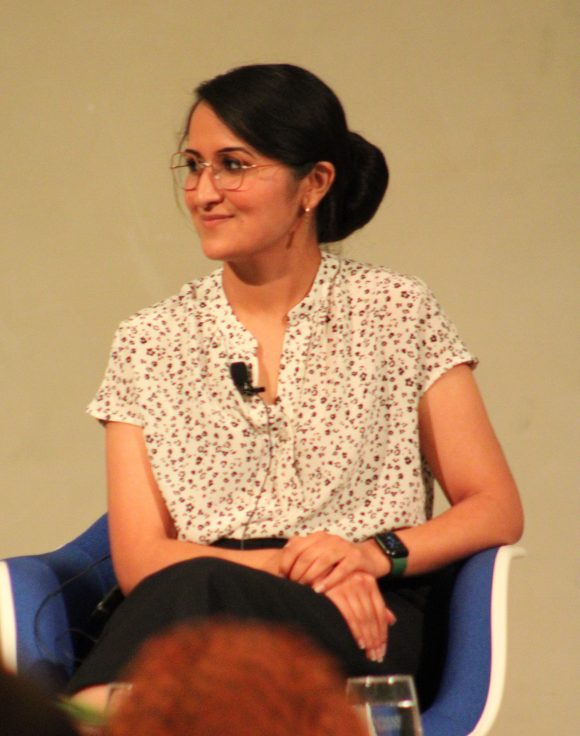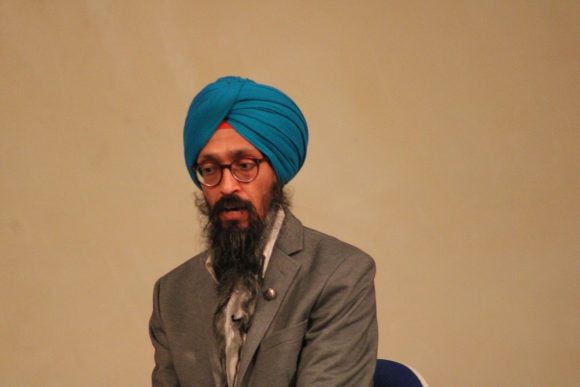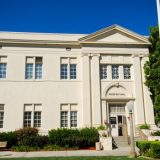
Cultural Appreciation, Appropriation or Assimilation? Engaging the World: Leading the Conversation on Ethnic Studies
October 17, 2022
Wilkinson College of Arts, Humanities, and Social Sciences and the Fish Interfaith Center welcomed anti-racism educator Manpreet Kalra and TEDx speaker Vishavjit Singh as part of Wilkinson’s Engaging the World: Leading the Conversation on Ethnic Studies series. The discussion, moderated by Rev. Dr. Gail Stearns, explored Sikh identity in the United States, and how racial, cultural, and ethnic biases should be confronted in today’s society.
FACING STEREOTYPES AND INTOLERANCE AS SIKH AMERICANS
Kalra works toward social and economic justice through Artisan-sector international and economic development. Throughout the conversation, she touched on her confrontations with racial biases.
“Intersectionality for me is recognizing that how people perceive me shifts. I will be at the airport and I will be seen as someone very different than what I am seen as sitting with you on this stage,” Kalra stated.
Singh, who lives in New York City, reflected on how he became the target of intolerance and racial stereotyping following the events of 9/11.
“I did not leave my home for two weeks, and when I did leave my home, almost every American either flipped me off, told me to go home, called me Osama Bin Laden… And these were people young and old, African American, Hispanic, White, men and women. It was a really strange time for me,” Singh said.
According to Singh, biases are a natural occurrence in human nature, enabling people to categorize genders, religions, and ethnicities into identifying factors. However, these biases can become harmful when they alienize particular groups of human beings.
“We are not intentionally trying to be mean and othering, we are an animal species who are wired to put people and things into boxes to simplify life. It helps us to categorize, but we also have to realize when you categorize people into ‘other people’,” Singh said.
DEFINING IDENTITY AND LIVING IN “THE GREY”
Throughout the discussion, Kalra and Singh also touched on how they define their identities as Sikh Americans, highlighting that their identities are intersectional and ambiguous. According to Singh, many of the harmful biases and stereotypes he faces in the United States provoke him to think critically about his identity.
“One thing that I hear a lot from people in my home city of New York is ‘go back home’, and that question on what is home and how it is tied to identity is something that impacts all of us. Most of us might not have to think about it, but for someone who looks like me, especially in post-9/11 America, I have to think about it and act on it for my own safety,” Singh said.
Singh not only identifies as Sikh, but a New Yorker, straight man, and illustrator, touching on how this affects his approach to his identity.
“How would we exactly approach who I am? I have come to the conclusion that it is okay living in grey spaces, and have your identity shift depending on where you are sitting,” Singh said.
According to Kalra, her identity also involves her “living in the grey”, or in other words, shifting her personal identity dependent on the environment she is in.
“My Sikh identity is one part of me, and it informs the way I think about concepts and my decision-making, but it is not the only part of my identity,” Kalra said.
Singh emphasized that Americans need to find a balance between important conversations and offensive conversations.
“I would say to young folks here, ask questions. While I am working with elementary school kids they ask me all kinds of questions, which I know adults have too. But they won’t ask because they are thinking ‘am I offending, is something going to think I am racist, or biased and prejudiced?” Singh said.
AJ Smith, a first-year sociology major, who attended the event, said he now has a better understanding of vulnerability within important conversations.
“I learned that in order to foster a new mindset for our contemporary society we need to be vulnerable. By vulnerable, I mean we must make mistakes, be okay with being a learner, and actively learn to unlearn biases. I really enjoy hearing perspectives different than my own,” Smith said.



